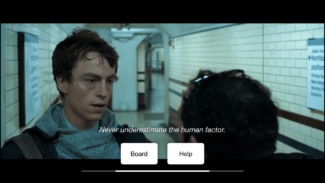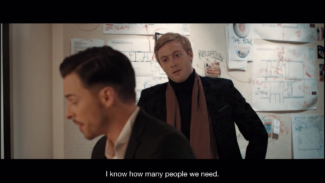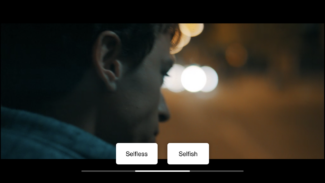Bastion
LQ: 9.15
Recommended Age: 10+
Skills Used: Planning, Working Memory, Mathematics, Reading

 Late Shift is an FMV (Full Motion Video) game where the user takes on the role of a young college student who is kidnapped and forced into helping a group of young thieves with a sophisticated heist. The player watches the action unfold as if they were watching a movie. However, there are times when the game will present the player with a choice to make that actually affects the course of the story. The player has a very limited amount of time to choose between their options or the game makes the decision for them. There are other times within the game where the player has the option to manipulate objects on the screen such as telephones and safe dials. These actions also affect the outcome of the story.
Late Shift is an FMV (Full Motion Video) game where the user takes on the role of a young college student who is kidnapped and forced into helping a group of young thieves with a sophisticated heist. The player watches the action unfold as if they were watching a movie. However, there are times when the game will present the player with a choice to make that actually affects the course of the story. The player has a very limited amount of time to choose between their options or the game makes the decision for them. There are other times within the game where the player has the option to manipulate objects on the screen such as telephones and safe dials. These actions also affect the outcome of the story.
 Late Shift features multiple different endings and over four hours of movie footage, meaning that your actions in the game can drastically change how the story progresses.
Late Shift features multiple different endings and over four hours of movie footage, meaning that your actions in the game can drastically change how the story progresses.
Late Shift is rated for users aged twelve and older. LearningWorks for Kids believes that parents should know what the ESRB ratings are for games and compare this to what they know about their individual child when making game purchasing decisions. More about this can be found in our article here.
Late Shift is available for purchase on both iOS and Steam.
Focus: Getting started and then maintaining attention and effort to tasks.
 Because Late Shift plays like a movie, the player needs to use their focusing skills to pay attention to the action, the characters, the plot, and what decisions they have already made. Without focus, important parts of the story may pass them by and leave them confused. For players who struggle with focus, the high energy entertainment of an FMV game is a fun and engaging way to practice both short term and long term focus. Short term focus can be practiced because the story as a whole is broken into shorter “chapters,” while long-term focus can be practiced because they player needs to remember the events from all previous chapters to make sense of what is happening in the current chapter they are playing.
Because Late Shift plays like a movie, the player needs to use their focusing skills to pay attention to the action, the characters, the plot, and what decisions they have already made. Without focus, important parts of the story may pass them by and leave them confused. For players who struggle with focus, the high energy entertainment of an FMV game is a fun and engaging way to practice both short term and long term focus. Short term focus can be practiced because the story as a whole is broken into shorter “chapters,” while long-term focus can be practiced because they player needs to remember the events from all previous chapters to make sense of what is happening in the current chapter they are playing.
Time Management: Working under pressure.
 When the player is called upon to perform certain actions or make decisions within the game, they have a very short amount of time to act. This is represented by a white line that gets shorter and shorter as time passes. If the player does not make a choice within that amount of time, the game chooses for them, potentially altering the story completely. The player needs to be able to work under pressure and make the decision they think is best for their game quickly without wasting time.
When the player is called upon to perform certain actions or make decisions within the game, they have a very short amount of time to act. This is represented by a white line that gets shorter and shorter as time passes. If the player does not make a choice within that amount of time, the game chooses for them, potentially altering the story completely. The player needs to be able to work under pressure and make the decision they think is best for their game quickly without wasting time.
All membership plans come with full access to our entire suite of tools learning guides, and resources. Here are a few of the ones we think you’ll like the most: